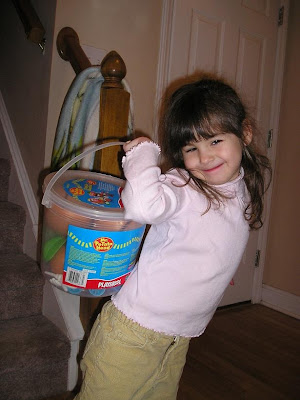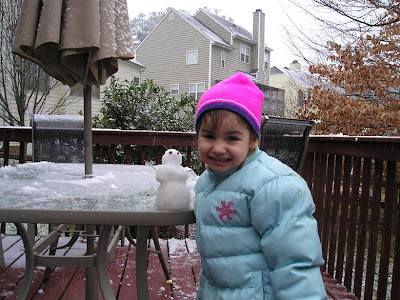I don't know that I'd necessarily recommend the book. It started off really good. I loved the first three chapters. Very interesting and informative. Made me look at motherhood and the history of our economy in ways I hadn't before. But then it jumped the shark and was a grueling chore for me to finish. Lots of recommendations about socialized health care and day care and why all women need to work to protect their financial well-being in case of a divorce. Just rubbed me the wrong way.
Even though I didn't love the book, there are points that have lingered in my mind since I finished it. I guess in that respect it was pretty powerful. One of the main points is about the value of the work of stay-at-home-moms. (SAHM's) I'd heard of "studies" that try to put a value on all of the tasks we do and come up with some astronomical six-figure income that would be necessary to pay us, but I hadn't really thought about the monetary investment that we're making through raising our kids. Crittenden talks about how human capital is THE most valuable resource in our economy. And I'm the one producing it! How's that for important?
Here's one of the quotes that drove that point home to me: "In a static, agrarian economy people cannot, and need not, make huge investments of time or emotion in their children. Early in life, with little or no schooling, children are able to become valuable assets, who work in the fields and the kitchen, tend the babies, care for the animals, and help in the family enterprise. An Indian baby in Guatemala can be safely tucked in a hammock all day with no harm done to his future as a subsistence farmer. But these practices provide poor preparation for success in a fluid and meritocratic society. It takes years of hard, patient work to mold infants into individuals who have the imagination to find a place for themselves in a competitive, mobile world, the self-confidence to strive, and the self-discipline to plan for an uncertain future."
See? All that time spent reading to my kids and putting them in time out when they've broken the rules IS valuable.
It's preparing them to be independent and intelligent contributors to our society. Ever thought of it that way? Most people don't. In my own little circle of interaction, I associate with so many other SAHM's, that I feel very confident in my choice to stay home and I don't feel looked down upon because I don't get paid for my work. But that isn't always the case.
I remember going to my 10 year high school reunion. I grew up in a small town and was voted "Most Likely to Succeed" our senior year. Yikes--that's a lot to live up to! In my eyes, I WAS very successful. I had finished my schooling, dabbled a little with working as a hygienist, and had made the conscious choice to stay home. I have an amazing husband, two adorable kids, and I am TRULY HAPPY. Isn't that the definition of success? Yet when asked by my former classmates, "What do you do now?" I found myself saying, "Oh, I just stay home with my kids."
I didn't catch it until the weekend was over and it was too late, but I was so mad at myself for describing my job that way. I wish I would've said something more along the lines of, "I have the best job in the world--I stay home with my kids!"
Ok, maybe something a little cheesy would suffice. Maybe I should've just typed up this quote from the book and passed it out: "The dominant culture of which I had been a part[the working world] considered child-rearing unskilled labor, if it considered child-rearing at all. And no one was stating the obvious: if human abilities are the ultimate fount of economic progress, as many economists now agree, and if those abilities are nurtured (or stunted) in the early years, then mothers...are the most important producers in the economy. They do have, literally, the most important job in the world."
Yea, I'm sure that would've gone over really well. My friends probably would've written me off as a psycho crazy defensive obsessed mom.
Anyway, one of the other major points I got out of the book is that even though many economists agree that human capital is one of the most valuable assets in the economy, the hard work that I do every day doesn't figure into the Gross Domestic Product. Isn't that interesting? Here's how the author put it:
"Thus the great part of women's work does not figure. Nothing counts unless it is bought and sold. This produces absurd perversities: a nurse feeding formula to a baby counts as productive activity, but a mother's breast-feeding doesn't; care for an aging relative in a nursing home counts, while at-home care by an unpaid family member doesn't; paying bills and taxes and planning family investments counts when done by an accountant, but not when done by a spouse; charitable contributions of money are tax-deductible, but volunteer donations of time are not; teaching twenty children in a classroom counts, while home schooling one's own children doesn't."
 Taking my daughter on an educational field trip to
Taking my daughter on an educational field trip tothe beach doesn't count toward the GDP??
What's up with that?
Next time we're having a rough day with the kids, let's remember the monetary value of the job we're doing. And see if we can talk our husbands in to giving us some vacation time or quarterly bonuses. It's worth a try, isn't it?




























































